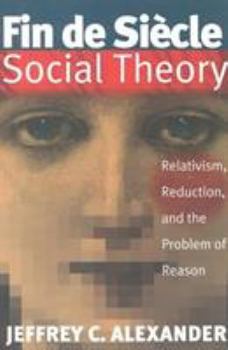Fin De Siecle Social Theory: Relativism, Reduction and the Problem of Reason
Select Format
Select Condition 
Book Overview
In four closely interwoven studies, Jeffrey Alexander identifies the central dilemma that provokes contemporary social theory and proposes a new way to resolve it. The dream of reason that marked the previous fin de si cle foundered in the face of the cataclysms of the twentieth century, when war, revolution, and totalitarianism came to be seen as themselves products of reason. In response there emerged the profound skepticism about rationality...
Format:Paperback
Language:English
ISBN:1859840914
ISBN13:9781859840917
Release Date:July 1995
Publisher:Verso
Length:240 Pages
Weight:0.95 lbs.
Dimensions:0.7" x 6.0" x 9.2"
Customer Reviews
1 rating
So where are all the neo-modernists?
Published by Thriftbooks.com User , 23 years ago
With this work, Jeffrey Alexander makes the long-overdue case for a "neo-modernist" position - for the belief that the project of modernisation has not finished. If you're wondering how to think in a post-modernist world, Alexander's stance gives you the answer: post-modernism has its uses, but modernism will survive.Indeed, in a practical sense, Alexander points out, modernism is thriving. The people who knocked down the Berlin Wall clearly did not believe that their reality was a linguistic construction. If they knew anything about Foucault's thinking, they knew better than to take it seriously. They wanted improvement, and they knew how to get it. So did the countless individual modernisers of East Asia who transformed the lives of both themselves and hundreds of millions of their fellow human beings through the 1970s and 1980s. So, although Alexander doesn't say it, did the people who brought technology to the forefront of Western thinking in the 1990s. These people all thought, in their different ways, that it was possible to make things better. The theorists who best explain such events are not Foucault, or Feyerband, or even Anthony Giddens; they're Talcott Parsons and Karl Popper and Joseph Schumpeter. The "alternative world" of most pre-1980s social theory is simply breaking down in the face of reality.Most of this thinking is contained in the brilliant opening essay (one of four in the book), an essay titled "Modern, Anti, Post and Neo". Alexander ends this piece by suggesting "a renewed sense of involvement in the project of universalism" is abroad in the world. The wonder is that the intellectual left has pursued it with so little vigour in the past five years. "Neo-modernism" precisely defines the spirit of the age, but where are all the neo-modernists?






